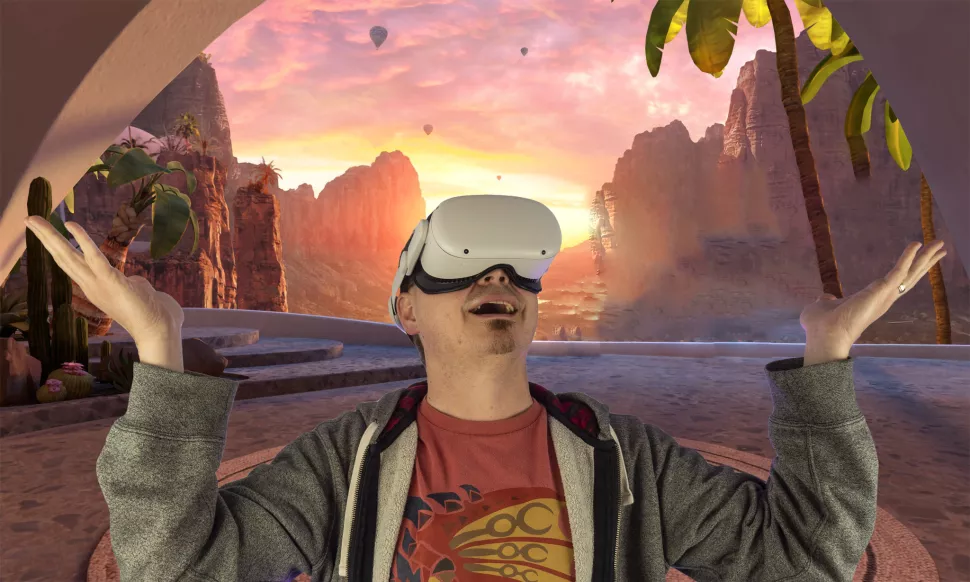Doubtless, when most people hear the term “metaverse,” they probably envision some sort of futuristic digital world where a person can be anyone or anything they want. That, of course, is thanks in part to science fiction — particularly the likes of shows like Battlestar Galactica’s Caprica prequel and movies or movies like Ready Player One — but the metaverse, as a concept, is so much more than that.
If we’re asking the question “Is the Metaverse(opens in new tab) really necessary?” by using a proper noun for the Metaverse then, no. A single one-size-fits-all solution for a digital world that’s designed to augment — or even replace, in some cases — our own real world is asking for trouble. If we’re delving into the idea that a metaverse is simply a collection of digital and real-world ideas melded into a cohesive space for people to socialize in then, yes, the metaverse is the future of human interaction. Part and parcel to the concept of a metaverse is the idea of digital ownership. Games like Fortnite, Minecraft, Roblox, and many others have created a digital world where people can build things and “own” digital items, but the term “ownership” here means something very different from how we think of it in the real world.
Even in special events or for special products — like Coca-Cola’s new pixel-flavored soda(opens in new tab) — the connection between owning a physical drink from the company and using it in Fortnite is completely disconnected. One has nothing to do with the other and, even if you were to complete all the challenges in Coca-Cola’s special Fortnite world, you’re not going to be able to turn in your accomplishments for a real-world sugary drink.
But real-world rewards for digital accomplishments isn’t a core issue. Rather, digital ownership as a concept is. Ownership in these games is tied exclusively to the account you opened when you began playing the game. If you were to lose access to this account — or have your account banned — you lose access to everything you spent real money on. Also, these digital goods cannot be carried from one game to another unlike how an object in the real world is transportable between locations.
The obvious solution to this is to provide a way to verify ownership outside of any one type of account system and, to a much more difficult degree, to allow digital items to be carried through digital worlds, no matter who makes the world.
NFTs, or non-fungible tokens, are likely the best way that’s yet been invented to assert ownership over a digital object. The problem with NFTs, in particular, is that the term has been hijacked by con artists and snake oil salesmen. NFT has become a bad word in modern digital culture, but the concept is still good so long as it can be used properly.
I’m not talking about buying stupid pictures of monkeys. I’m talking about using the concept of an NFT — a digital receipt, of sorts — to prove real ownership of intangible digital objects. This could mean anything from the skin on your digital avatar to a plot of “land” in a digital metaverse.
In one example, a mixed reality metaverse called QuestoWorld (pictured above) uses a limited number of NFTs to assert “ownership” of a digital portion of a real-world city. Players can build real-world quests on top of one of these realms — a term the game uses to refer to digital property — which involves players walking around the real-world location of a realm solving puzzles and riddles. Quests are paid games, a portion of which goes to the person who owns the realm on top of which the quest is built.
QuestoWorld is more like the ARGs (alternate reality games) of yesteryear than a broader metaverse concept that Zuckerberg spun at last year’s Connect conference. In many ways, it’s a bit like Niantic’s Ingress, a game where players walk around the real world to do battle in the digital world. Niantic eventually birthed Pokemon Go as an evolution of this concept.
Having a way to verify ownership beyond your account is an important beginning and, if we’re to take the metaverse concept seriously, has to be laid as the groundwork to convince people that investing time and money into a digital world is actually worth it.
Exchanging real money for digital currency that’s unique to a specific game is just fine as well, but a proper metaverse with its own currency concept would need to provide a way to exchange that money back to another currency if the user deems it necessary. Again, if this is going to be an augmentation of reality, then digital currency should be exchangeable in the same manner as exchanging currency in a foreign country.
Source: https://www.androidcentral.com/virtual-reality/is-the-metaverse-necessary
